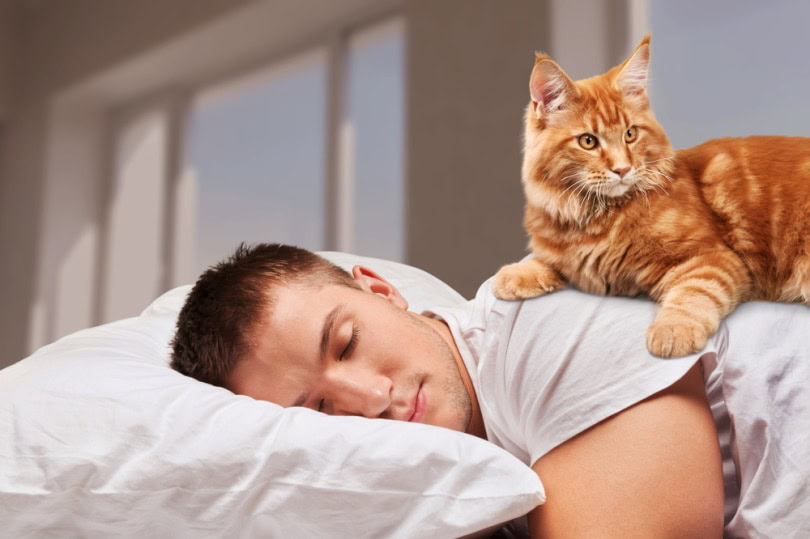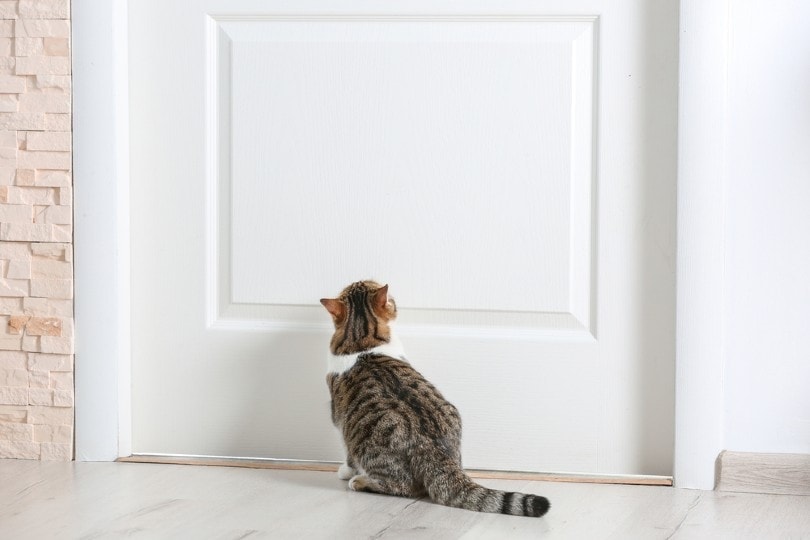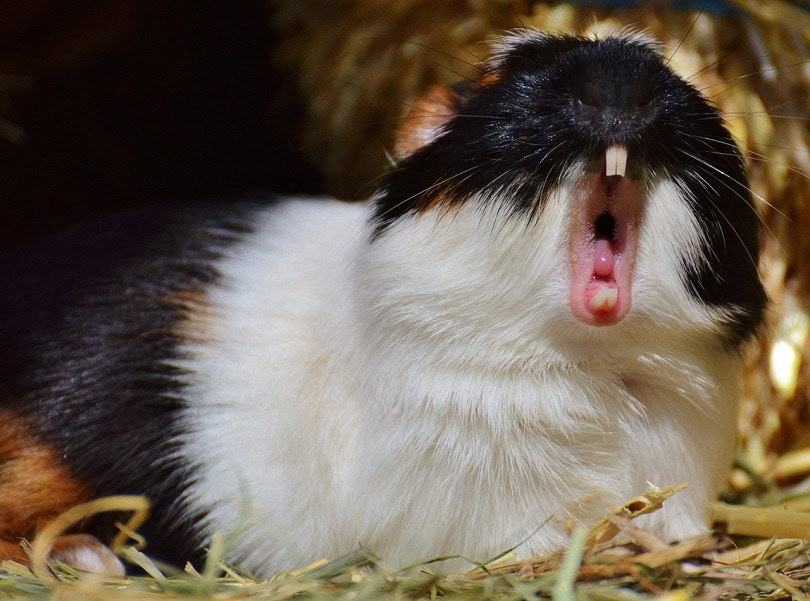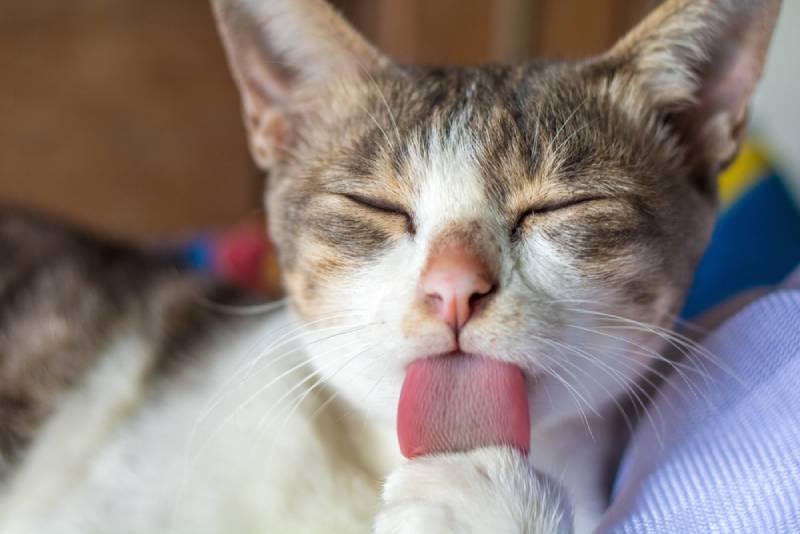Click to Skip Ahead
Happy, healthy, and content cats typically use their litter box when they need to go potty. Therefore, if your cat starts to pee in inappropriate places, it’s normally a sign that something is amiss. If your feline is exhibiting strange urination patterns, including peeing on your bed or on you while you sleep, know that this can happen due to medical problems, stress, and various other reasons, so it’s crucial to know when and how to react. No matter what you do, be gentle with your pet when these mishaps happen, as they’re typically signs that something is off with your feline.
Read on to learn more about the possible reasons that a cat may inappropriately urinate, why your cat peed on you while you slept, and how to keep your pet from peeing on your bed.
Important information: Inappropriate urination in cats should never be ignored, as it can signal underlying behavioral or medical concerns requiring prompt evaluation. Certain urinary issues may pose a serious threat to your cat’s health. If you observe your cat struggling to urinate, crying out during urination, straining unsuccessfully, producing urine with an unusual color, or urinating more frequently than normal, seek veterinary care immediately to avoid potential serious complications.

The 6 Reasons That Your Cat Might Be Peeing on You While You Sleep
1. Your Cat Is Experiencing Underlying Health Problems
Various medical issues can affect your cat’s urinary system, leading to irregular peeing patterns and your cat urinating in odd places.
Here’s a list of common health problems in cats that can lead to your cat peeing on you while sleeping:1
- Feline idiopathic cystitis
- Urinary tract infections
- Urinary stones or crystals
- Chronic kidney disease
- Diabetes
- Hyperthyroidism
- Arthritis
It’s also possible for your cat to experience other health issues, such as muscular pain, that cause discomfort and prevent your feline from going in the litter box. If you suspect that an underlying health problem is the reason that your cat peed on you while you were sleeping, it’s best to consult your veterinarian. They will perform the needed testing, clarify your concerns, and offer treatment options if necessary.
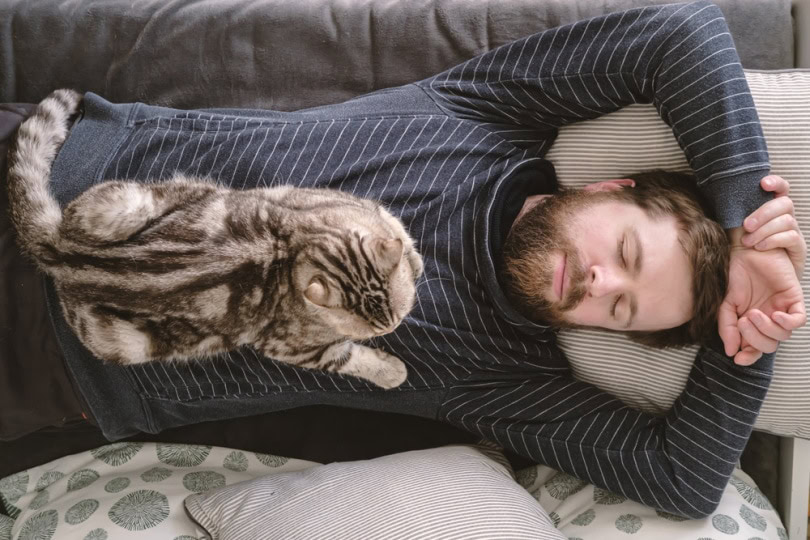
2. Your Cat Is Scared, Stressed, or Anxious
Felines can feel scared, stressed, anxious, or fearful for various reasons, and stress may lead to your cat peeing on you while you’re sleeping. It’s common for stressed and anxious cats to display all kinds of strange behaviors and signs,2 including:
- Peeing in the wrong places (inappropriate urination)
- Spraying or marking
- Overgrooming
- Changes in appetite
- Vocalizations
- Changes in behavior such as hiding
Since stress can lead to your cat urinating in the wrong place, it may be the reason that they peed on you while you were asleep.
Anxiety and stress should never be overlooked, so it’s essential to speak to a vet or feline behaviorist to learn what is behind your cat’s discomfort, and how you can help them.
3. Your Feline Is Dealing With Environmental Changes
Cats may go outside of their litter box and accidentally urinate on you during bedtime when they’re dealing with environmental changes. These can represent anything from having a new baby or getting a new pet to moving to a new home.
Cats function best in environments that are known and predictable; even minor household changes can cause your cat to exhibit various abnormal behaviors.
Since environmental changes can significantly impact your cat, endeavor to help your cat adapt to their new surroundings to prevent undesired behaviors like urinating in the wrong places—unless you want to wash your sheets every day!
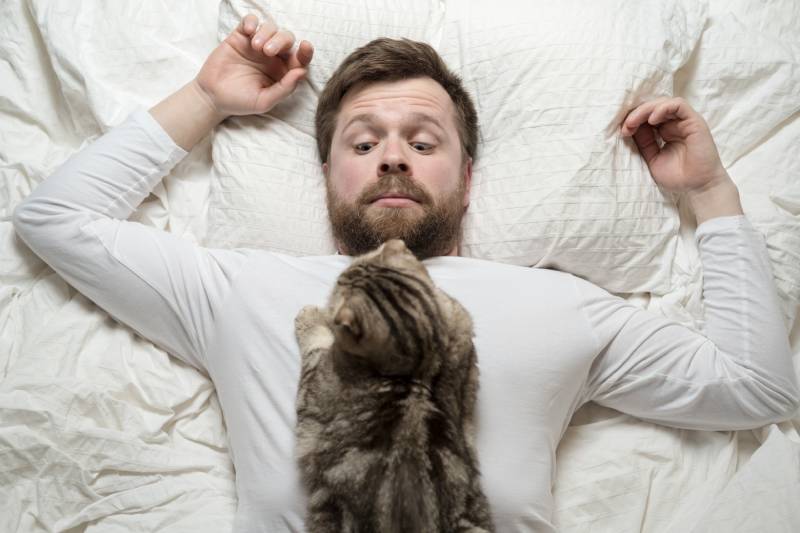
4. Your Cat Doesn’t Like the Litter or the Litter Box
Cats can urinate in inappropriate areas when they dislike their litter and/or litter box. If you’ve bought an unsuitable type of litter box for your cat, they may be deterred and urinate in other spots, including your bed, while you sleep. This can happen when the litter box is too large/small, uncomfortable, or simply ill-fitted.
Also, your feline may pee on you while you sleep if you change their litter type; most cats get used to a particular type of litter, so if you decide to switch it up, you may notice changes in your pet’s urination patterns.
So, if your cat urinated on you while you were asleep, ensure that the litter box and litter are suitable and are not preventing your feline from using them.
5. The Litterbox’s Location Doesn’t Suit Your Cat
Cats need a peaceful area to do their business, so their litter box needs to be in a quiet, easy-to-access space that doesn’t have much foot traffic. If you place your cat’s box in a hard-to-reach spot where there’s noise or people, your feline may be deterred from using it and may urinate in other places instead, such as on you while you sleep.
Since the position of the litter box may lead to involuntary peeing around the home, try to place multiple litter boxes in areas where your cat likes to spend time, to prevent mishaps from happening.
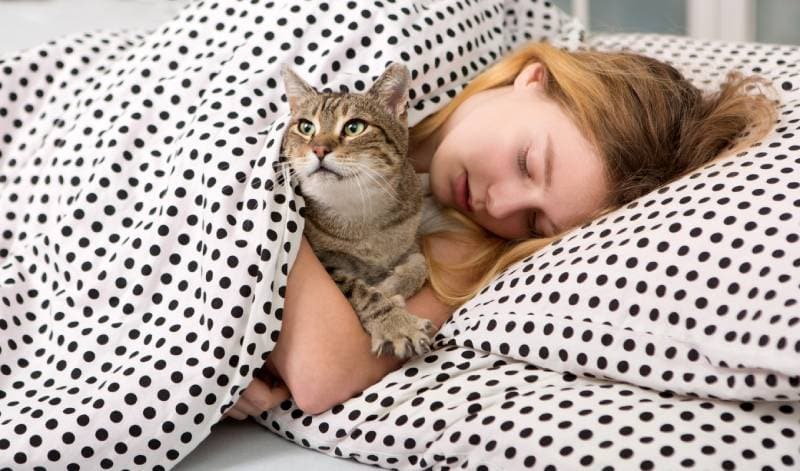
6. Your Cat Is Spraying or Marking
Cats may spray or mark their spots and territory as a way to find comfort in their new environment. When cats engage in this behavior, they typically mark vertical surfaces by raising their tail and releasing a small amount of urine. However, it’s also possible for cats to occasionally mark horizontal surfaces.
Although all cats are capable of marking, this behavior is particularly noticeable in unneutered males and females. Spraying/marking can often be a hard habit to break, but you start by neutering your cat to reduce the chances of these territorial displays.
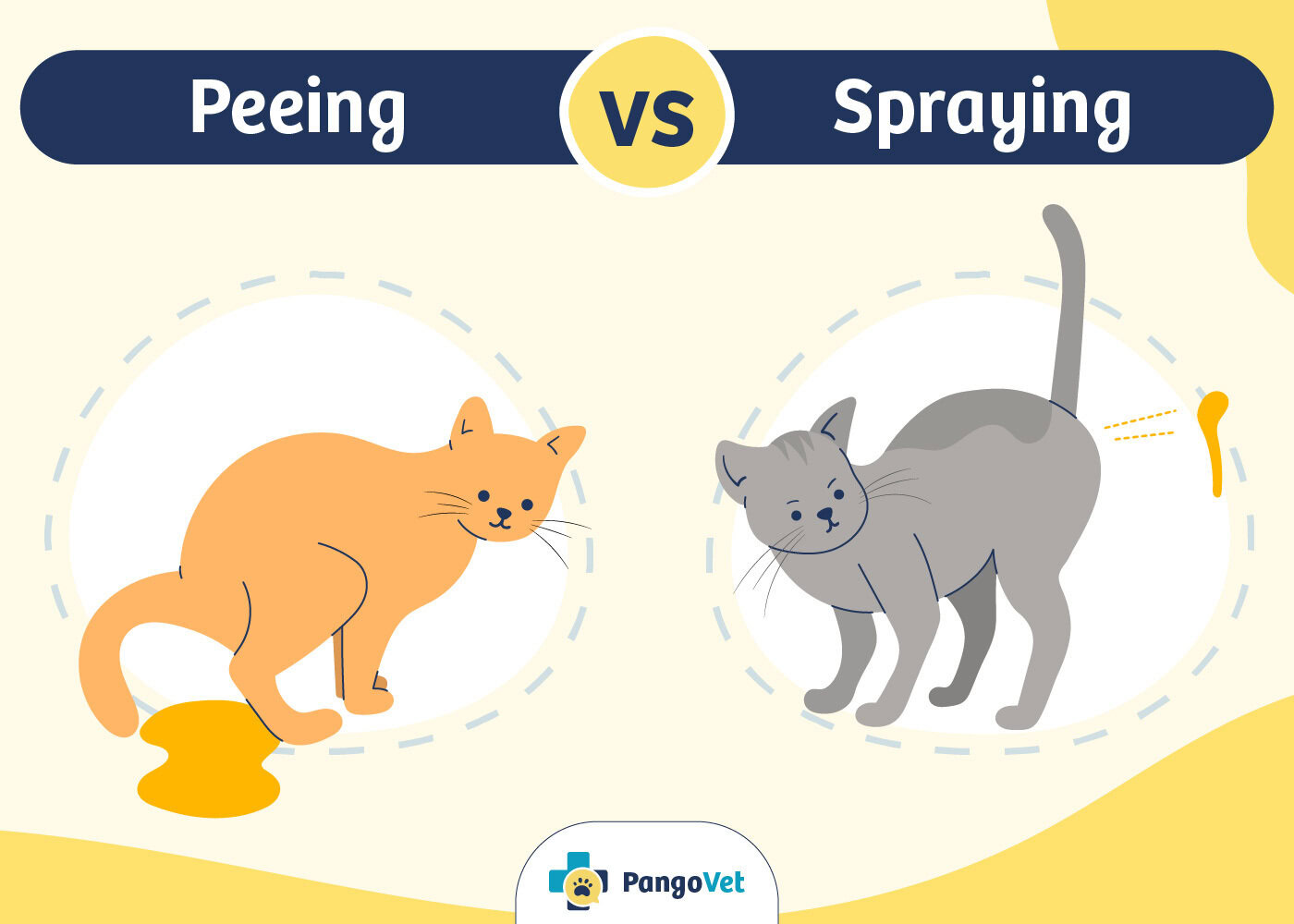

When Should You Speak With A Vet About This Issue?
If your feline has suddenly started urinating in odd places, including peeing on you while you sleep, the underlying cause of the issue may be medical, so it’s best to schedule a vet check-up to see if everything is okay with your pet.
Inappropriate urination in cats may be due to easily readily fixable problems such as a type of litter or litter box position that doesn’t suit your cat, but it may also indicate health problems that need prompt addressing, such as cystitis, hyperthyroidism, or kidney problems. Therefore, it’s better to be safe than sorry: Have your cat checked and tested by a vet. If there are no medical problems, you can seek advice on how to handle your cat’s urination problem.
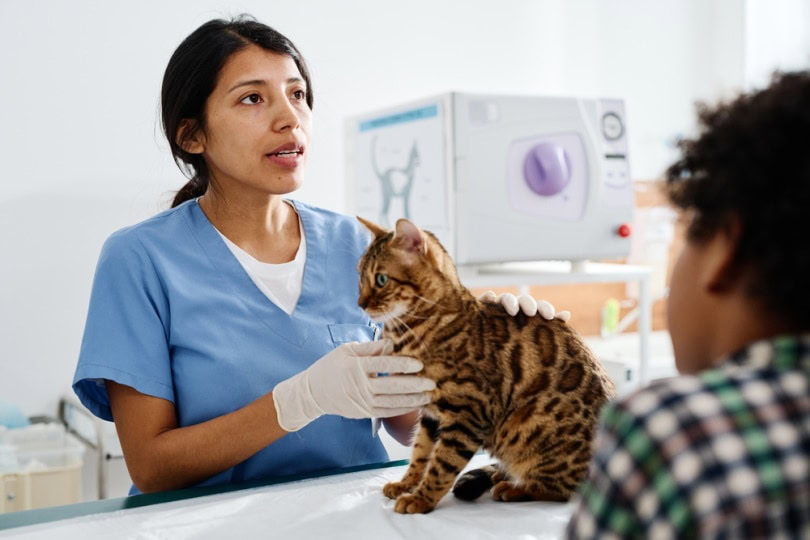
How to Prevent Your Cat From Peeing on Your Bed While You Sleep
Since your cat peeing on your bed or on any other spot in your home is a sign that something is not right with your cat and can be frustrating and unsanitary, it’s essential to learn how to prevent your pet from engaging in such behavior.
- Take your cat to the vet to rule out any possible medical issues that may be causing your pet to pee around the house. If your feline is experiencing a health problem, the vet will prescribe the needed treatment.
- Spend more quality time with your cat; bonding with your feline will reduce their stress and anxiety, which can be the cause of inappropriate urination.
- Ensure that your home is a safe and happy environment where your cat can unwind and relax.
- Provide your cat with needed cuddle time and enough play sessions.
- Thoroughly clean any areas where your feline peed inappropriately to prevent them from marking those spots repeatedly.
- Clean the litter box regularly, provide clean litter, and if necessary, place multiple litter boxes around the home.
- Be patient and avoid punishing your cat, as it will likely cause the problem to persist instead of resolving it.
Helping your cat live in a calm and peaceful environment will have an overall positive impact and likely stop unwanted behaviors like peeing inappropriately.


Conclusion
Although having your cat pee on you while you sleep can be extremely annoying or uncomfortable, it’s essential to approach this problem calmly and help your cat instead of punishing them.
Ensure that your cat gets the needed vet check-up, provide them with a suitable litter box and litter, and help your cat adjust to any changes in your household. By showing love, kindness, and patience to your pet, you should have no problems correcting this behavior.
Featured Image Credit: Billion Photos, Shutterstock
